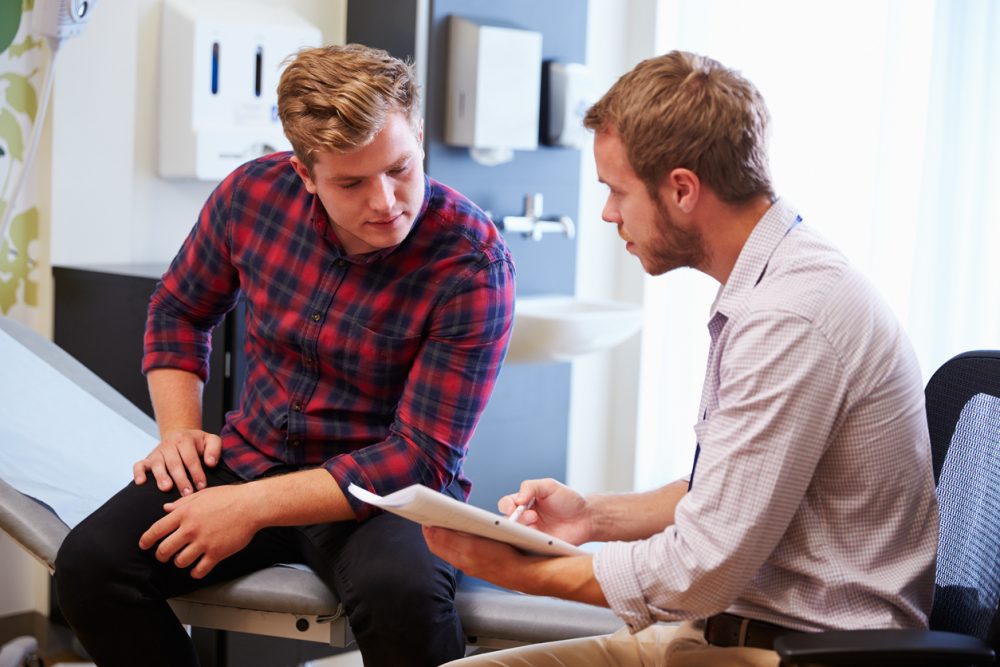In a blog for our special series ‘The Problem With Sex’, trainee paediatrician and Cochrane Fellow, Rufaro Ndokera (@NdokeraR), asked five trainee doctors to share their experiences of talking with patients about sex.
Page last checked 30 January 2023
Problems with sex are not a common theme of office water cooler chat. As the current Cochrane fellow, when the subject of the #TheProblemWithSex spread across the Cochrane UK office I knew we, the Cochrane Trainees, should get involved, but what would we have to offer? Unsure, I approached a few members of the Cochrane UK Trainees Advisory Group to comment on their experiences with talking about sex and sexual problems with patients, especially those with chronicA health condition marked by long duration, by frequent recurrence over a long time, and often by slowly progressing seriousness. For example, rheumatoid arthritis. conditions. As a group with a wide range of clinical experience I was keen to hear their thoughts and here they are.
Contributors to this piece are:
Chris McAloon (CMc) @DrChrisMcAloon – a Cardiology Speciality Trainee at University Hospital Coventry and Warwickshire NHS Trust
Eoin O’Sullivan (EOS) @Eoinrenal – a Renal Specialty Trainee currently based in Edinburgh.
Rachel Kuo (RK) @RachelYLKuo – a core surgical trainee based in the East of England deanery.
Chris Jones (CJ) @DrCMJones – an Academic Clinical Fellow in Clinical Oncology based at the University of Leeds and Leeds Cancer Centre.
Natalie Blencowe (NB) @NatalieBlencowe – an NIHR Clinical Lecturer and upper GI surgical trainee in the Severn Deanery
I asked them about evidence and their experience.
What research are you aware of in your clinical area about sex, sexual problems and sexuality?
CMc: I am aware of little research in terms of sex and sexuality in cardiovascular research.
EOS: Every so often I come across an article about sexual problems in chronic kidney disease (CKD) / dialysis patients, but it is not one of the main areas of research that I come across clinically. There is plenty of research activity in terms of fertility and pregnancy related outcomesOutcomes are measures of health (for example quality of life, pain, blood sugar levels) that can be used to assess the effectiveness and safety of a treatment or other intervention (for example a drug, surgery, or exercise). In research, the outcomes considered most important are ‘primary outcomes’ and those considered less important are ‘secondary outcomes’. and pre-eclampsia, which is obviously closely related, but I feel somewhat different to sexuality.
CMc: I have not seen much even in coronary artery disease or heart failure which I would think would be a more common area of discussion. I am not saying there isn’t, it’s just not something I see in the mainstream. I do have discussions regarding sex and directly related to contraception in the adult congenital heart disease clinic.
RK: In my current job I am not aware of much research activity on the subject. This could be due to my ignorance rather than real paucity of research though. Many ENT disorders and diseases have a very negative impact on patient quality of life. Meniere’s disease, for example, has a hugely negative psychosocial impact and is strongly linked to depression; there have been some studies showing a link with “sexual function disorders”. Informally, I imagine that having constant tinnitus and nausea would not be conducive to a good sex life.
CJ: There is quite a lot of research relating to sexual activity, problems and side effects in the field of oncology – certainly more than in the other fields discussed here. A lot of this is in areas such as prostate cancer, where surgery, radiotherapy and hormonal therapy are all known to have an impact on patients’ sexual function. Similarly, I have seen research into the impact of preventative oncological surgical procedures such as risk-reducing mastectomy. In other areas, there is some arguably lower profile – though no less important – research into the impact of anti-cancer therapy such as chemotherapy in other tumour sites such as lung cancer. I am not sure to what extent this research has been extended to different cultures and in minority groups, though.
NB: I don’t think there’s much research in relation to sex and surgery. That said, there’s some evidence to suggest that surgeons probably don’t discuss it enough! I was recently involved in a studyAn investigation of a healthcare problem. There are different types of studies used to answer research questions, for example randomised controlled trials or observational studies. which summarised the contents of Patient Information Leaflets for oesophagectomy (one of the most major elective operations there is – more risky and invasive than a heart bypass procedure). We found that although almost all of the leaflets discussed the (many) potential complications of the procedure, very few discussed the longer-term effects on patients’ quality of life, and even fewer mentioned sex. Sometimes we forget about the human aspect. We know from research studies that it can take 12 months for patients to regain their pre-operative quality of life levels, yet this is not routinely discussed. It’s an achievement to get up stairs let alone have sex! The anatomical alterations also have implications – for example, because the oesophagus is replaced with a tube of stomach, many people experience bad reflux after the operation. Lying down can therefore be a really unpleasant experience.
Have you come across any barriers/difficulties when talking about sex with your patients? Are there any ideas/resources you feel may have helped at the time?
CMc: I have not found many barriers when it’s relevant to talk to patients about sex. The most common discussion is related to men and the microvascular complications of diabetes, which includes 10% of male diabetic patients developing erectile dysfunction. I don’t know of any specific resources for breaking the boundaries. I have been aware, ever since my undergraduate training, of the importance of and impact on sex for certain patient groups and I am relatively comfortable addressing this. There are general themes as a cardiologist I encounter and can normally anticipate; not using GTN spray concurrently with phosphodiesterase inhibitors e.g sildenafil, when can you have sex after a heart attack (if you can walk a flight of stairs without angina) and what drugs we start may cause erectile dysfunction.
EOS: Just like CMc I’ve have a number of conversations with male patients with CKD about erectile dysfunction with much the same themes. There can be a general decline in libido in progressive CKD which is sometimes mentioned, but honestly not often. The research that does exist suggests this is really very common, so now that I stop and think about it, it’s pretty surprising that I don’t spend more time talking to patients about it, isn’t it?
I know that the National Kidney foundation has a nice primer on this, Sexuality and Kidney Disease, but I dont think Ive ever actually shared it with a patient before.
CMc: I agree with Eoin. It is surprising cardiologists don’t talk about it more. Sex is impacted by a lot of cardiovascular conditions and treatments. It is an important aspect of quality of life yet we give it little weight.

CJ: I think it’s probably site and context-specific with cancer. In areas such as prostate cancer these conversations are a normal part of clinic and something that is addressed both by the medical team and our specialist nursing colleagues. In other tumour sites there are, I suspect, conversations that might seem more ‘pressing’ such as those relating to prognosis or anti-cancer treatmentSomething done with the aim of improving health or relieving suffering. For example, medicines, surgery, psychological and physical therapies, diet and exercise changes. choice, and it may be that we don’t specifically ask about sex as much as we should, and that in turn patients don’t wish to mention it. Cancer Research UK has extensive and really helpful information in How cancer can affect your sexuality and sex life, as do Macmillan Cancer Support on Sex and cancer.
NB: One of the biggest problems is time. Although clinic would seem the most appropriate place to have the discussion, appointment slots are short and there are many other things that (rightly or wrongly) take priority, such as assessing someone’s fitness for surgery, discussing the details of the procedure with them, and answering their questions.
Tell us about your experience of a time a patient has brought up issues surrounding sex and sexuality with you, as their doctor
NB: I really cannot recall anything about a patient bringing up sex issues: most of our patients are emergency admissions (so unwell and it’s not something they are thinking about!) or undergoing major operations.
CMc: The most common theme I encounter is side effects from cardiovascular medicines on erectile function. I have had many men over the years discuss the impact of Beta-Blockers on their ability to get and maintain an erection. I find male patients are often reluctant to discuss this and it is a very important issue for them. They often feel in turmoil as they are told these drugs are great for their hearts, but causes a massive side effectAny unintended effect (e.g. dizziness or a headache) of an intervention such as a drug, surgery or exercise. that impacts their quality of life.
EOS: I remember growing to know gentleman who crash landed into haemodialysis. After developing a rapport with him over many months, one day in clinic he became very emotional and confessed that the worst part of his treatment wasn’t the travel, sickness or boredom on the dialysis machine, but the fact he still saw his wife as a beautiful woman who he loved and felt was very attractive, but couldn’t do anything at all about it. He had no libido, as well as physiological erectile dysfunction. They had been a very intimate couple and he felt it was irreparably damaging his relationship. I still remember him telling me he felt like “half a man”. The reality is that sex is a huge part of people’s personality and identity, and I get so caught up in blood tests and “tangible” medical problems, I rarely thought about it. I found it a very sad conversation, not least because there was no great evidence base from which to offer any therapy, instead I could only offer support and an ear to listen.
RK: I had a job on the gastroenterology firm which was one of my first attachments. I met a young woman, who was about my age or younger, who had inflammatory bowel disease (IBD) and eventually progressed to needing a stoma. The team had been good about flagging up the idea of a colostomy early on in her disease, so that it wouldn’t be as much of a shock when/if it happened. She and I were able to talk quite frankly, I think because we were in a similar age group and she found it easier to talk to me. She was really worried about her self-image and how she would be able to “explain” her stoma bag to future partners, or if she would be able to find any future partners. I didn’t really have many concrete answers for her, but I think it helped her to explore her fears, and we were able to talk a couple more times after that encounter.
CJ: I recently saw a patient on one of the acuteA health condition (or episodes of a health condition) that comes on quickly and is short-lived. general medical assessment units who had a recent diagnosis of diabetes. He was dehydrated and unwell so our focus had been providing him with fluids and lowering his blood sugar. I was therefore a little surprised when, not long after he was admitted, and whilst still unwell, this gentleman broached the topic of erectile dysfunction with me. He was unaware this was a potential consequence of diabetes because a language barrier precluded him from understanding the information leaflets on diabetes that he had previously been provided with, which certainly highlights the importance of providing readily accessible information.
What do you feel might help you and your colleagues better approach issues around sex and sexuality with patients?
CMc: A cultural change around sex and sexuality might help, to make us more open to discussing the issue. I also feel in the NHS on general wards we have very little ability to undertake conversations in private and this is a big issue.
EOS: You’re totally right. I can barely talk about boring topics on a ward round without the whole room listening. It’s not an environment conducive to conversation like that. Clinic is more appropriate, but even then, patients aren’t raising the issues often. I know I should ask them, but it’s a complex and long conversation that deserves time. This is difficult in a busy clinic . When I have to focus on their transplant/ renal issues and chase biochemical/clinical outcomes it gets pushed to the wayside.
CMc: Completely agree, clinic is the best environment, but in the NHS with finite time to give a patient this is not the topic at the top of our list.
RK: Privacy is a huge factor- and time spent with patients. It is a bit much to jump from “Hi, I am Dr XYZ, how can I help” to talking about potentially sensitive topics. I feel that to approach sex and sexuality appropriately you need to have some time to build a rapport with the patient.
CJ: I agree with the need for more appropriate environments for these discussions. I suspect we lose sight a little of how distressing it must be to know that on a ward there may be between three and five other patients beyond the curtain potentially listening to every part of a patient’s discussion with healthcare professionals. I would also argue that we need to become more proactive in asking about these things – we may even find we’re currently a little ‘ageist’ in those patients we choose to start these conversations with.
NB: Completely agree with all of the above. In my current job (upper GI surgery) it’s usually the specialist nurses that discuss this issue with patients. Usually, they have fewer patients to see in clinic, and make several follow-up phone calls to each one, so there are more (private) opportunities to talk about it, and perhaps more time too.
So what are my thoughts?
For us as trainees, doing the job but constantly learning, barriers such as time, privacy and the ability to develop a rapport are all potential barriers to discussing problems with sex. Despite this, it is heartening to hear how some trainees have been able to advise, direct and support patients on what may be a difficult journey, both medically and otherwise.
It looks to me that the opportunity to reflect in this way could really change the way these trainees may approach issues surrounding sex and sexual problems in the future. I also hope it will encourage others to review their practice and make their clinic room a place for patients to feel comfortable sharing their concerns. Where evidence is lacking, as trainees and future consultants, a safe space, a listening ear and recognition of problems surrounding sex and sexuality may be all we can offer, but sometimes that may be just what our patients need.
Many thanks to all trainees involved here for taking the time to share your experiences.
All the blogs in our series on sexual problems can be found in the blog The problem with sex: a taboo that’s harming patients?
Please note, we cannot give specific medical advice and do not publish comments that link to individual pages requesting donations or to commercial sites, or appear to endorse commercial products. We welcome diverse views and encourage discussion but we ask that comments are respectful and reserve the right to not publish any we consider offensive. Cochrane UK does not fact check – or endorse – readers’ comments, including any treatments mentioned.


